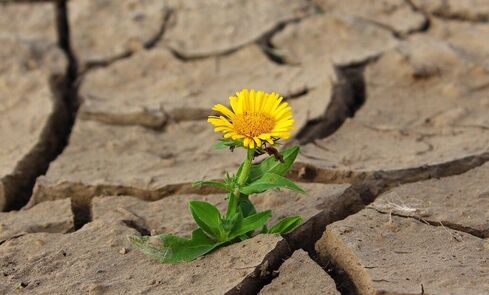By Joel Bates We are taking some time over the next several months to share some of the stories, situations, and meaning behind each of our Core Values and how these values have come to shape the ministry of Discovery Ministries. Committed to the Process of Wilderness is our fourth Core Value. We continue to find these to be relevant to our current way of life in the midst of the coronavirus pandemic. Wilderness exists in many forms. We call the high up, way back regions of Alaska and Canada “wilderness;” if the altitude and extreme cold don’t getcha, then the grizzly bears will. Beware of the Australian Outback wilderness—that waterless wasteland where fire ants, dingoes, and dehydration pose daily threats. And let’s not forget the 70% of planet Earth’s surface—the high seas—a wilderness where squalls materialize out of thin air, waves the height of buildings crush sailing vessels, and predators beneath the surface indiscriminately feed on plankton or people. These regions immediately portray “wilderness” for us. But, I think wilderness can also appear as apartheid alienation, pain and abandonment in the loss of a loved one, or uncharted chaos during a worldwide pandemic that separates people and threatens our well-being. I think we can all agree that wilderness is scary and often lies closer to home than we think. By definition, “wilderness” is as an uncultivated, uninhabited, and inhospitable region, but I think it is more than that. In fact, I believe everyone experiences a wilderness trial at some point in his life, and many of us are wandering in a wilderness right now. I take people orienteering. Now, some of you love getting lost between the pages of a good book. For others it’s losing yourself in a sporting event or in a deep conversation with an old friend. But, when I take people orienteering, we lose ourselves in the forest. No really, we get lost! I mostly know where I am because I’m the facilitator. The group, on the other hand, has no idea where they are. They have to use their tools—a map and compass—to get themselves unlost and out of the wilderness. I had given one team of students a destination atop a hill directly in front of them. They looked at the map skeptically, turning it round, squinting their eyes first at the map and then at the hill before them and then back at the map as they tried to gain some piece of perspective. Once satisfied with a plan, they set off to go around the hill. On the backside of that same hill, they glared at the map, annoyed that the hill remained imposing from their new vantage point. They set off again to skirt the base of the hill until they could get a better view of yet another steeply sloping side. They repeated this process for hours until, after exhausting all other options, they simply marched up the hill to the top. When I asked them why it had been such a difficult decision to go to the top, they responded that they thought there had to be an easier way. The truth? There was no easier way! Real life can intimidate us this way sometimes. When we are faced with an unfamiliar path, something out of our control, or a situation we don’t understand, we’d rather just avoid it. We become masters at avoiding the uncomfortable or unwanted inconveniences as we distract ourselves, trying to find another way around. Usually with God, there is no other way. Jesus said, “I am the Way, the Truth and the Life.” That’s a pretty black-and-white statement that leaves little room for argument. Ah, but consider how good this destination is. All of God’s destinations are good! Using the wilderness as a tool to grow His people is hardly new for God. For instance, we all remember His leading the faithless, rebellious Israelite's into the Sinai wilderness. They ended up wandering around for 40 years, and most stayed there in shallow, desert graves. But the new generation, who had grown up in the wilderness, facing its adversity on a daily basis and seeing God’s deliverance as commonplace, confidently stepped into the flood water and crossed the Jordan, marched around Jericho and captured the walled city, and overtook their enemies to conquer the Promised Land. When God’s people emerged from the wilderness, they were a very different people from the previous generation that entered the desert. And let’s not forget king David. He is known as the greatest king of Israel, but prior to his coronation, he spent years running and hiding from Saul. We can read many of the psalms that record his struggles during his time spent in isolation and exile, his wondering if God was ever going to see him through to his promised anointing. No other king of Israel experienced this tremendous trial of wilderness wandering, but no other king of Israel was as great as David. There’s a correlation: great biblical heroes often went through wilderness adversity in preparation for their calling. God knows that whether you’re facing giants in the land, economic uncertainty, or crisis in a difficult relationship, you just have to trust Him with your life—hand the fears and identities over to him, lay everything at his feet—and go through. Most wilderness produces dread and fear in us, but on the other side of the wilderness, we find a door by which we enter a vibrant, dynamic life. Here are some truths to consider as you deal with the process of wilderness:
1 Comment
By Leah Fuller We are taking some time over the next several months to share some of the stories, situations, and meaning behind each of our Core Values and how these values have come to shape the ministry of Discovery Ministries. Called to Adversity is the third Core Value we're sharing & seems relevant to our current way of life in the midst of the coronavirus pandemic. The cold rain pelted us; the rushing river was already full and continued to rise as we huddled on the bank trying to stay warm. All 13 of us moved together like penguins, stamping our feet and trying to generate as much warmth as we could for one another. We made constant adjustments to the black tarps we had wrapped around us to block the wind. Making eye contact with Joel, my co-instructor, we slipped out of our slight shelter and into the elements to discuss a plan. We needed to find a good campsite away from the rising river. The high bank across the river seemed our best option. Over the next several hours, our group ferried across the river, dragged the canoes up the bank, carried them deep into the woods, set up shelter, and got a fire started with dry wood from a fallen tree. Huddled around the fire that night during a brief respite in the rain, we discussed the reality of the adversity we were facing and its effect on us. Some felt defeated, others optimistic, but overall a heightened tension permeated our beings. Could we endure eight more days like this? In the midst of adversity, affliction, and pain, everything in us aches for relief and comfort. In moments like the one described above or like the current pandemic we are facing, we glance longingly at the clouds hoping to see blue sky, searching for anything that might give us hope that this adversity might end soon. In our everyday lives, we seek the comfort of a warm home for safety, food to satisfy our hunger, and relationships to enable us to feel valued and loved. We do not usually choose or willingly enter into difficult situations, but let’s face it, no matter how much we seek to avoid painful and adverse circumstances, they are part of our human existence, a consequence of the fall in Eden. In Genesis 3:14-19, we read of the enmity that exists between humans and Satan, the pain endured in childbearing, the grief and conflict that will arise in our relationships with one another, and the painful toil of work. So, since we know that adversity is inevitable, why do we spend so much time avoiding and running from it? Part of the reason is that we are ill equipped to know how to handle such difficulty, and therefore, seek relief from things that will not satisfy. Like the author of Ecclesiastes, we discover sooner or later that this searching for pleasure and comfort to satisfy us is meaningless! Jesus tells us in John 10:10, “I have come that they may have life, and have it to the full.” Taken out of context, this looks like exactly what we want, a promised life of prosperity and ease. But, look more closely; this passage appears in the context of sheep facing the reality that thieves, robbers, and wolves constantly threaten. Their only hope of a full life is dependent on the “good shepherd laying down his life for the sheep” (John 10:11). Additionally, James commands in chapter 1:2-3 to “consider it pure joy, my brothers, whenever you face trials of many kinds, because you know that the testing of your faith develops perseverance.” James doesn’t say if you face trials; he declares that when we face trials, we are to consider it joy. The truth hidden in these verses does not suggest we enjoy the trial itself, but we consider it joy that we have the opportunity to encounter testing, knowing the outcome will produce perseverance and ultimately transformation. Paul agreed and affirmed this truth as he sought to strengthen and encourage the disciples of the churches in Lystra, Iconium, and Antioch saying, “We must go through many hardships to enter the kingdom of God” (Acts 14:22). The assumption, even the command, throughout scripture is that we will encounter adversity, hardship, and struggle in our lives. More than likely we will also find ourselves questioning how much more we can endure. Yet that question is what leads us to the end of our human resources. We admit our insufficiency, and opting for deep trust and surrender, we profoundly experience God’s love for us. As Paul says in Romans 8:35 & 37, “Who shall separate us from the love of Christ? Shall trouble or hardship or persecution or famine or nakedness or danger or sword?...No, in all these things we are more than conquerors through him who loved us.” It is for these reasons that we, as believers, are called to adversity. We need risk, discomfort, and ambiguity to disrupt our lives to truly undergo transformation. Through adversity we receive an invitation into deeper trust and surrender. God invited the students on that trip to depend on Him fully just as He is inviting us now, in the midst of isolation from a pandemic we did not choose, to allow this adversity to transform us and lead us into a deeper, more integrated life in Christ. The weather did not let up that night; in fact, the storm brought with it a relentless fury that pounded us as we slept. We awoke to a swollen river and the need to step into even greater adversity over the course of the following eight days. Some of our participants have summarized this call to adversity so well: “Adversity, being any challenge which disrupts the comfort of one’s walk of life, causes a perspective shift…There probably comes a point when I can no longer rely on myself, but turn to Christ’s guidance and provision.” “Adversity gives us opportunity to grow because the goal seems set just beyond our capability. It’s finding yourself in a set of circumstances more difficult than any you’ve encountered before. The choice is simple – stay in the same place as before or press into the adversity and develop new muscles…Adversity is an invitation into a richer, deeper life.” The Apostle Peter confirms these truths when he says, “…though now for a little while you may have had to suffer grief in all kinds of trials. These have come so that your faith – of greater worth than gold, which perishes even though refined by fire – may be proved genuine and may result in praise, glory and honor when Jesus Christ is revealed” (1 Peter 1:6-7). Questions for reflection: Do you agree that you are called to adversity as a follower of Christ? Why or why not? Based on truth from Scripture, how might God be inviting you to be transformed and to engage a deeper trust relationship with Him through the current pandemic? Have you found yourself living a life of comfort? In what ways might God be inviting you to receive or embrace adversity in order to grow? How will you approach God, every day life, and relationships differently because of the adversity you have encountered in this season? |
Come along side us as we journey in and out of the wilderness, discovering our Creator in creation.
Archives
July 2024
Categories |
Contact Us
|
|

 RSS Feed
RSS Feed

